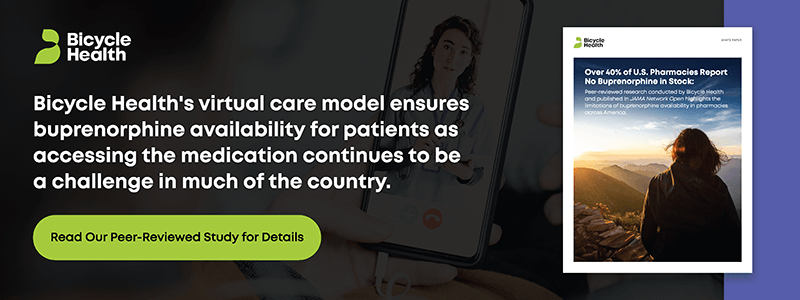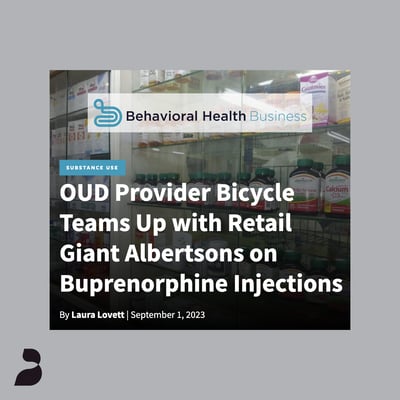One of the most devastating facts about the opioid epidemic is that we have a means of treating it, but it is largely underutilized and inaccessible. Due to a multitude of social and policy limitations, less than 60% of pharmacies across the country report having medication to treat opioid use disorder (MOUD) in stock.
But collaborative efforts from providers, pharmacies, and advocates can challenge this statistic and provide more immediate access to MOUD (like buprenorphine) for patients. This is why grocery chain Albertsons’ decision to collaborate with us in August to offer monthly buprenorphine injections (known as Sublocade) is so critical. The joint effort has expanded MOUD access in 13 states despite ever-changing federal and state policies.
Addressing the opioid crisis is no easy feat, but efforts to expand treatment access—in spite of policy barriers at the federal and state level—are a starting point. Partnerships like ours are increasing access to different treatment modalities and bringing care to more patients across the country. With more efforts like this, I believe that we will begin to see immediate progress towards reducing the effects of the opioid epidemic.
The courage of Albertsons’ in context
In many cases, poor accessibility to MOUD is a result of a lack of clearcut policies for pharmacies. Until the COVID-19 pandemic paused previous restrictions, pharmacies were not allowed to fill MOUD prescriptions written by telehealth providers. These restrictions have been lifted through 2024, but large pharmacy chains like Walmart still won’t fill some prescriptions—more so out of fear of regulatory scrutiny and confusion around policies than legal limitations.
Albertsons became the first national supermarket and pharmacy chain to offer monthly buprenorphine injections on-site at their pharmacies. Similar to the process of taking buprenorphine for treatment, patients will meet virtually with a member of Bicycle Health’s clinical team to receive a prescription for Sublocade. Then, once a month, patients will visit their pharmacy to receive their injection, allowing them to get care in a private, outpatient setting before returning to their day-to-day lives.
Albertsons' decision to offer Sublocade injections is significant for two reasons. First, it expands access to new forms of Medication-Assisted Treatment (MAT) to more people. Second, it eliminates potential barriers to telehealth prescriptions for buprenorphine.
Sublocade only needs to be administered once a month to maintain treatment adherence. This offers some patients an easier alternative to remembering to take an oral medication everyday. And instead of taking it at home, Sublocade is administered in person by a provider. Not only does this eliminate the risk of diversion or misuse—two common arguments against telehealth prescriptions—it reduces the stigma patients face while seeking treatment. This modality brings comfort to patients seeking additional privacy. Parents, spouses, and young adults can access confidential, discreet treatment at their local pharmacy like they would any other medication, without bringing additional scrutiny into their homes.
Collaborative efforts are just one way to combat the epidemic
Our work with Albertsons is increasing access to MOUD’s life-saving benefits. I’m very proud to say that Bicycle Health has expanded our clinical practice guidelines so that we can refer patients to Albertsons to receive these injections as an alternative to taking a daily dose of buprenorphine orally, when medically appropriate.
There are many ways to combat the opioid epidemic using effectiveness methods like telehealth to increase access to buprenorphine in different and effective form for patients.
The reality is, it doesn’t matter how we offer treatment, as long as more patients with OUD are able to access it. Expanding treatment to include as many proven modalities as possible can help us reduce the devastating statistics surrounding this crisis. Instead of working against progress, we need to be running towards it.




